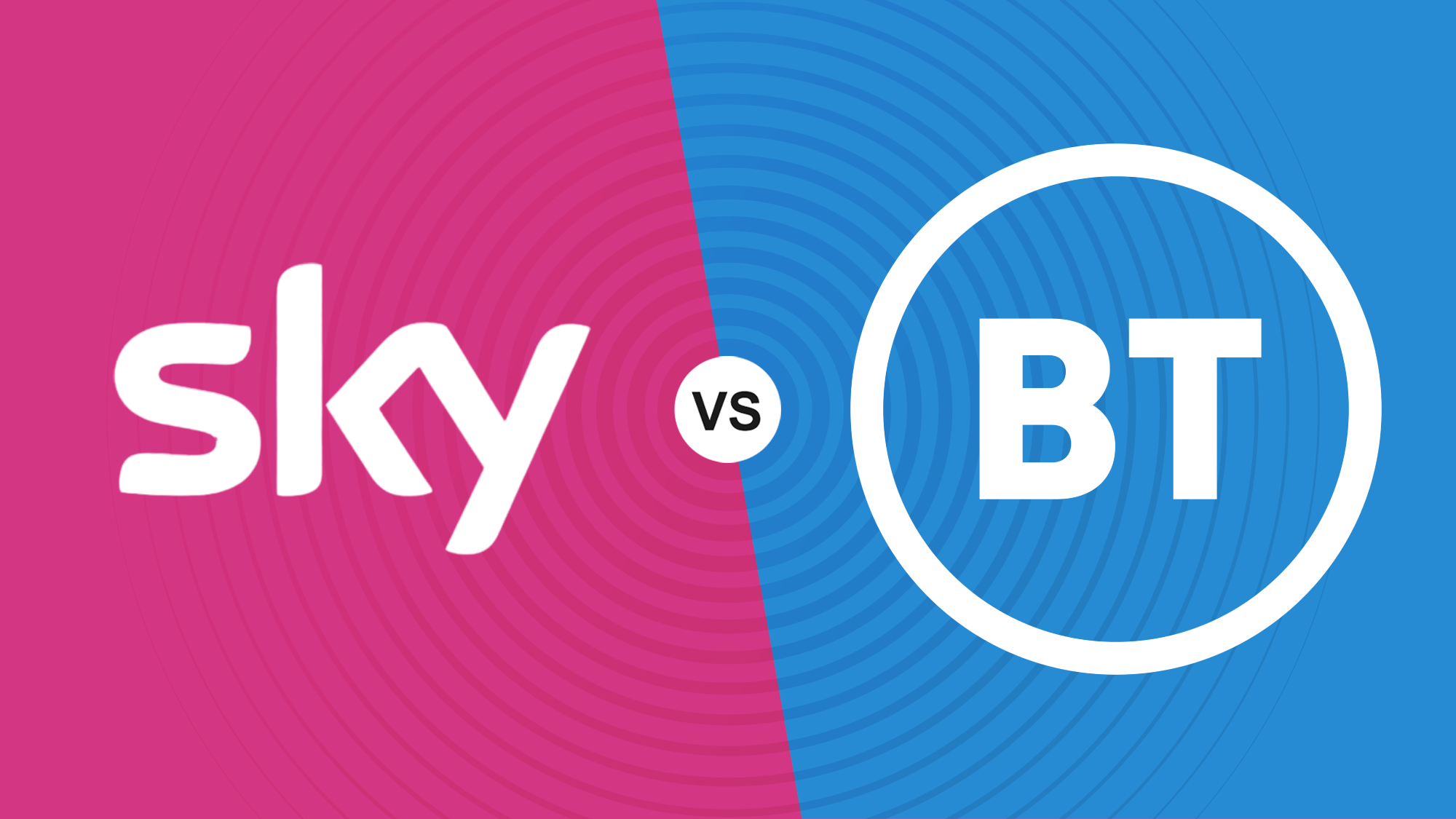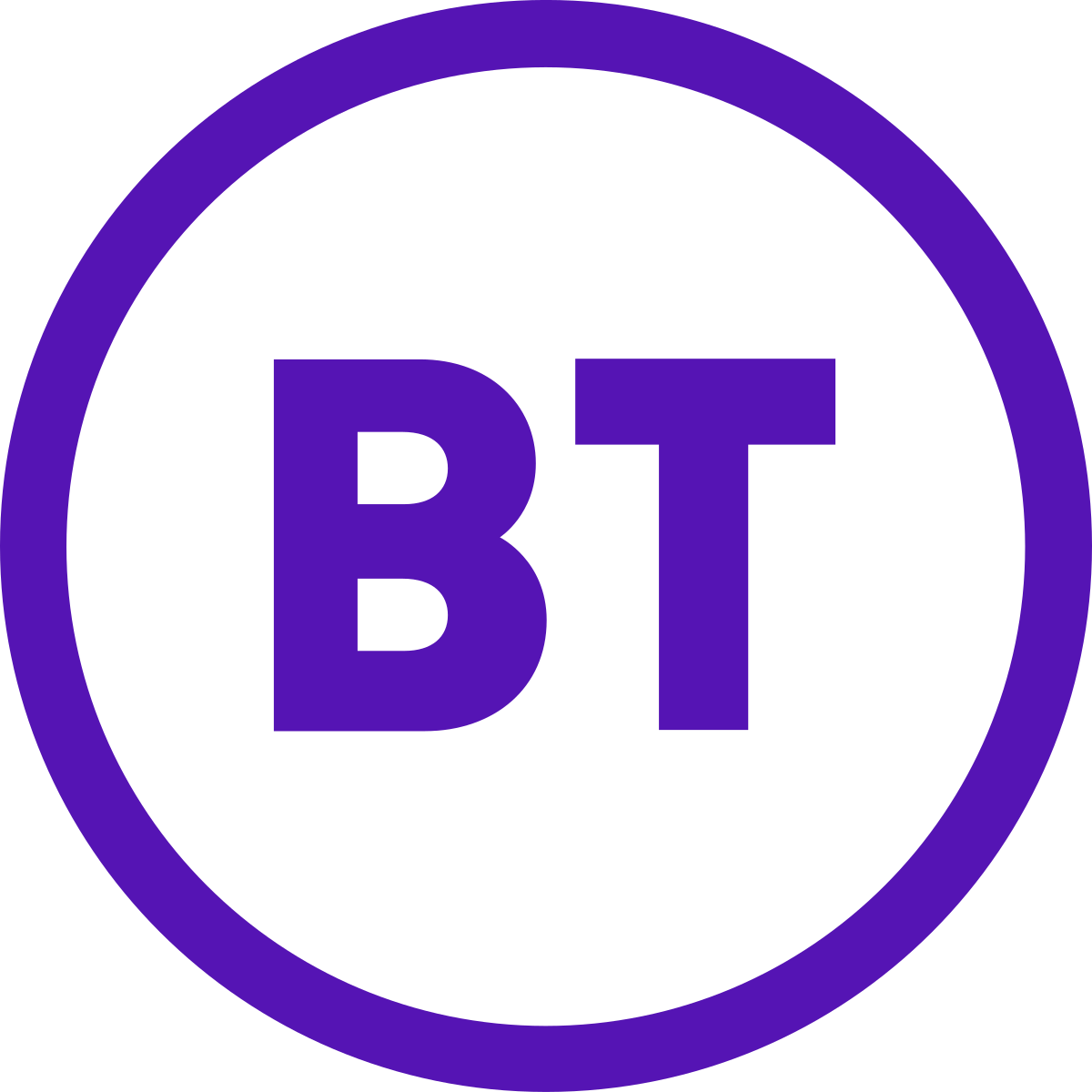Sky vs BT broadband: which is the better provider?
BT broadband and Sky Broadband are two of the most popular broadband choices in the UK, but which is the best option?

Sign up for breaking news, reviews, opinion, top tech deals, and more.
You are now subscribed
Your newsletter sign-up was successful

ADSL: Yes
Fibre: Yes
Full Fibre: Yes
TV bundles: Yes
BT is perhaps the best known broadband provider in the UK and it has a lot going for it. Whether it's the wide variety of speeds or its many add-ons and bundle packages, there's plenty to like about this popular brand. However, it can be an expensive option, particularly if you want more than just its broadband.
Pros
- Big choice of speeds
- TV bundles are available
- High quality router
Cons
- Can be expensive
- Some flexibility on contracts
- Limited access to Full Fibre

ADSL: Yes
Fibre: Yes
Full Fibre: Yes
TV bundles: Yes
Sky is perhaps better known for its TV packages, rather than its broadband. But the truth is that much like BT, Sky has a wide range of its own broadband options to discover. These also cover a variety of speeds and come with plenty of great tech and extras, too. However, Sky can also be quite pricey.
Pros
- Offers a range of speeds
- You can add on TV bundles
- Quality customer support
Cons
- Setup costs can be high
- Even slow speeds are pricey
- Only has 24-month contracts
Both BT and Sky don't really need an introduction, as these two heavyweights of the digital media world have been offering everything from top broadband deals, to TV packages and phone services to millions of customers across the UK for many years.
While Sky is also historically arguably better-known for its huge choice of broadband and TV packages, this is also something BT has been playing catchup with in recent years and both are now firmly established as providers of broadband and TV.
The similarities don't stop there, either. Whether it's the range of broadband speeds, tariffs, added extras, dependable service and even monthly costs, separating these two can be somewhat challenging!
But luckily this is where we can help, as we've done the hard work for you in this guide and delivered our verdict on which is the better broadband provider. So read on to help yourself determine whether it should be Sky or BT if you're in the market for a new broadband deal, or a new broadband and TV bundle.
Sky vs BT: broadband options
BT and Sky both have broadband speeds ranging from entry-level ADSL to ultrafast 'Full Fibre', all with unlimited downloads - although both now only provide ADSL to areas that aren't on the Openreach fibre network they both use. However, this range means they can suit the needs of pretty much any size of household, but that said, BT does have a little more variety in its current selection.
At a glance, BT has these broadband speeds available:
- BT Broadband Unlimited: 10Mbps avg. speed (ADSL)
- BT Fibre Essential: 36Mbps avg. speed
- BT Full Fibre Essential: 36Mbps avg. speed
- BT Fibre 1: 50Mbps avg. speed
- BT Full Fibre 1: 50Mbps avg. speed
- BT Fibre 2: 67Mbps avg. speed
- BT Full Fibre 2: 74Mbps avg. speed
- BT Full Fibre 100: 150Mbps avg. speed
- BT Full Fibre 500: 500Mbps avg. speed
- BT Full Fibre 900: 900Mbps avg. speed
By contrast, Sky has the following speeds available:
Sign up for breaking news, reviews, opinion, top tech deals, and more.
- Essential Plus: 11Mbps avg. speed (ADSL)
- Superfast: 61Mbps avg. speed
- Full Fibre 100: 100Mbps avg. speeds
- Ultrafast: 145Mbps avg. speeds
- Ultrafast+: 500Mbps avg. speeds
- Gigafast: 900Mbps avg. speeds
From a top level perspective, there's not a great deal in it here and because both providers use the Openreach network, your access to the ultrafast speeds will be the same no matter who you choose.
However, a key difference here is contract length. Right now Sky exclusively offers 24-month contracts, while BT has 12 and 24-month contracts. So if you don't want to be tied down for a longer period, BT just edges this one.
Sky vs BT: broadband add-ons and extras
There's also not much in it regarding who has the best add-ons and extras that you can make the most of. With both you can get the following:
- A landline with a choice of call packages for both domestic and international calling
- Access to millions of Wi-Fi hotspots around the country
- Wi-Fi guarantees in your home where you can get money back on your monthly costs if you suffer outages or performance issues
- Virus protection for any devices using the Wi-Fi
You of course also get a router with either provider, but in our roundup of the best BT broadband deals you'll see that we were quite impressed with the powerful BT Smart Hub 2. However, Sky does have its 'WiFi Guarantee' service that does regular line checks and gives you priority access to a Sky engineer, should you have any issues with your connection.
You could argue that Sky just edges this one as it does now also offer an insurance product 'Sky Protect'. This 5-star Defaqto rated home insurance is being offered with its broadband and it has a specific focus on covering smart tech.
However, with both providers, if you do want to start bolting on more, you will quickly find your monthly costs getting much higher.
Sky vs BT: broadband and TV bundles
It's no surprise that Sky takes home all three points over BT here as it offers a much larger selection of TV bundles and entertainment packages that you can have with your broadband. Even the basic options with Sky give access to a huge number of channels and Box Sets. Plus, you can choose to add extras like Sky Sports and Sky Cinema, if you want them.
To add to this, Sky has its own viewing services including Sky Q, Sky Stream and Sky Glass that offer different functions like pausing and recording TV, using catch-up and simply streaming your channels instead of using a satellite dish. You can see a full breakdown of these in our guide to the best Sky Broadband and TV bundles.
This isn't to say BT's TV bundles aren't great. There are still some decent packages - which it now offers as EETV due to its recent partnership with this company - that include discovery+ - which now has its old sports channels on. You can even access Sky Cinema and there are still plenty of top Box Sets to enjoy. The core difference is you just don't get as much choice, nor can you get as many viewing platforms and services.
That said, a common theme between these two with their respective TV bundles is that neither are particularly cheap, especially if you want access to things like sport and movies.
Sky vs BT: broadband cost
On the subject of cost, from a broadband-only perspective, neither Sky nor BT tend to rank amongst the cheaper end of the market. From a top level perspective, Sky's prices can range from £28 p/m for its 'Superfast' package, up to £50 p/m for its Gigafast option.
BT has slightly more expensive prices, with its lowest price currently being on its Fibre 1 package at £34.99 p/m. These then gradually increase and top out at £59.99 p/m for its 'Full Fibre 900'. Both also tend to have one-off setup fees in place. Sky say its fees start from £19.95, while BT's typically start from £31.99.
We should point out here though that, you can also get more cost variations with BT and by this we mean, if you pick a 24-month contract over a 12-month one, the monthly costs will invariably be a bit lower.
Should you want to include a TV bundle, you're also looking at adding upwards of £50+ each month for the full Sky package to go with its mid-level broadband. The same can be said for BT, as even with fewer channels you can be paying around £70+ p/m for its mid-level fibre broadband with an entertainment package on top.
Despite this, there are still some bargains to be had if you look at the right time. Both Sky and BT do regular promotions, deals and offers - especially during sales events like Black Friday, but they've also been known to drop the prices for other occasions. This best thing to do to stay up to date with this is to regularly check our best broadband deals.
Sky vs BT: broadband customer service
A little research shows a generally positive view for both BT and Sky when it comes to customer service. Also, on closer inspection, it does seem that Sky edges it here.
Both have help services via phone, email, social media, apps and online, as well as wider technical support options. Although the most recent Ofcom broadband complaints review shows that Sky had the fewest (6) complaints per 100,000 customers and BT had more (9), although this was still just below the industry average of 11.
On top of this, Ofcom's separate 'broadband satisfaction' study shows that they both score highly - 82% for Sky and 83% for BT, plus for complaints handling they score 55%, which is above the industry average of 51%. These are also amongst the highest ratings from all the other leading broadband providers.
Verdict
At the top of our review you'll have noticed we gave Sky and BT four stars each and unfortunately we'll have to sit on the fence with this one and call it a draw.
There's very little to tell them apart in terms of their respective extras, pricing and customer services and both are solid options for TV and broadband.
However, given the slight difference in the TV or broadband-only offerings, we can say that if you definitely want to add on some entertainment packages, Sky is probably right for you. Equally, if you just want dependable broadband, BT has a better range of speeds, so go for them.
As we've alluded to earlier though, if you're after affordability with your broadband, you'll probably want to shop around as you can definitely get cheaper deals elsewhere.
Broadband deals comparison
Still not sure what the best broadband options for you are? We've got you covered! Just enter your post code into our comparison tool below to see the very best deals for your specific location.

Rich is a freelance copywriter and content strategist with over 10 years' experience. His career has seen him work in-house and in various agencies, producing online and offline content marketing campaigns and copywriting for clients in the energy industry.